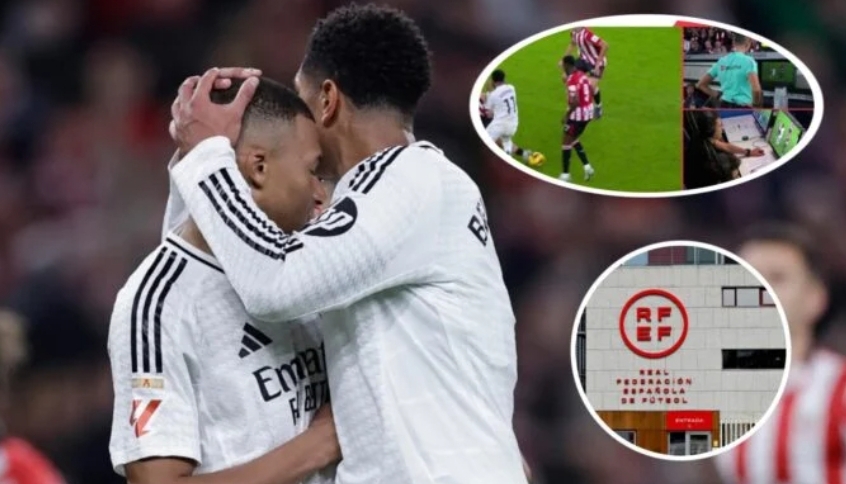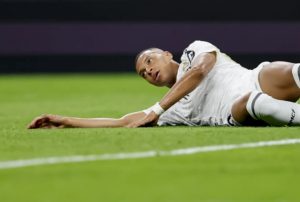The highly anticipated match between Athletic Club and Real Madrid became the latest chapter in La Liga’s ongoing saga of controversial VAR decisions. At the heart of the debate was VAR official Figueroa Vázquez, whose comments during a pivotal moment in the match raised questions about the consistency and reliability of video-assisted refereeing.
The incident occurred when Real Madrid forward Rodrygo Goes made a daring run into Athletic Club’s penalty area, only to clash with defender Joseba Gorosabel. As Rodrygo hit the ground, calls for a penalty rang out from the Real Madrid camp. Figueroa Vázquez, analyzing the footage, told on-field referee Sánchez Martínez, “he never touches the ball,” implying that Gorosabel failed to make any contact with the ball and that a penalty should be awarded.
However, slow-motion replays painted a more nuanced picture. The footage clearly showed Gorosabel slightly deflecting the ball before Rodrygo’s foot connected with the defender’s ankle. Despite the VAR official’s insistence, Sánchez Martínez made the rare decision to overrule VAR and refused to award the penalty to Real Madrid. Such defiance by an on-field referee against VAR’s recommendation is uncommon and has sparked heated discussions among fans, analysts, and pundits alike.
Rare Refusal to Follow VAR
The decision by Sánchez Martínez to contradict VAR is an anomaly in modern football. Since the introduction of the technology, referees have been heavily reliant on VAR to ensure accuracy in crucial decisions. This incident highlights a significant shift, where an on-field referee exercised independent judgment, creating both admiration for his courage and frustration over the inconsistency of the process.
For Real Madrid fans, the incident was yet another instance where they felt the decisions went against them. Many supporters believe that VAR has often been used unfairly in matches involving the club, adding to their grievances. The ruling also reignited debates about whether VAR truly serves its intended purpose of eliminating errors or merely adds another layer of controversy to an already subjective sport.
Figueroa Vázquez’s Questionable History
This isn’t the first time Figueroa Vázquez has found himself in the spotlight for controversial decisions. Earlier this season, during Rayo Vallecano’s clash with Barcelona, his actions once again came under scrutiny. In that match, Vázquez failed to acknowledge a blatant foul by Rayo defender Florian Lejeune on Barcelona’s Dani Olmo inside the penalty area. At the time, Rayo were leading 1-0, and a penalty could have changed the trajectory of the match.
The controversy didn’t stop there. In the same game, Vázquez played a role in disallowing a goal scored by Robert Lewandowski. The Polish striker’s effort was chalked off after VAR deemed that Jules Koundé had committed a foul in the build-up. These decisions left Barcelona fans fuming and led to widespread criticism of Vázquez’s judgment.
VAR’s Role in La Liga Under Fire
Figueroa Vázquez’s growing list of contentious calls has fueled broader criticism of VAR’s implementation in La Liga. Many believe the technology, intended to bring clarity and fairness, has instead created confusion and inconsistency. The apparent lack of accountability for VAR officials has left fans and clubs frustrated, as decisions continue to impact the outcomes of critical matches.
The Athletic Club vs. Real Madrid incident serves as a case study of the ongoing issues with VAR. While technology is expected to reduce human error, its effectiveness relies heavily on the judgment and integrity of the officials using it. In this case, Figueroa Vázquez’s interpretation of the incident was called into question, leading to skepticism about his ability to handle high-stakes situations.
Impact on Real Madrid and Barcelona
For Real Madrid, the refusal to award a penalty was more than just a missed opportunity—it was a blow to their pursuit of vital points in the La Liga title race. In a highly competitive league, where every match matters, decisions like these can have long-lasting implications on a team’s season.
Barcelona, too, have felt the sting of VAR inconsistencies this season. The incidents in the Rayo Vallecano match denied them a chance to secure a comeback victory. For a team competing on multiple fronts, such decisions can derail momentum and morale, leading to frustration within the squad and fanbase.
Calls for Accountability
The repeated controversies involving VAR officials like Figueroa Vázquez have led to growing demands for reform. Many fans and analysts are calling for greater transparency in how VAR decisions are made. Suggestions include releasing audio recordings of conversations between VAR officials and on-field referees, as well as implementing post-match reviews to assess the accuracy of contentious calls.
Additionally, there are calls for stricter accountability measures for VAR officials. Just as players and managers face consequences for their performances, VAR officials should be held to similar standards to ensure fairness and credibility in the decision-making process.
The Bigger Picture
While Figueroa Vázquez’s decisions have drawn ire, they also highlight the broader challenges of integrating technology into football. Unlike other sports where video review systems have been widely accepted, football’s dynamic and subjective nature makes it uniquely challenging to apply VAR consistently.
As La Liga grapples with these challenges, the league’s reputation is at stake. Fans, players, and clubs all want to see matches decided by skill and strategy, not by contentious refereeing decisions. Addressing these issues is essential to restoring faith in the system and ensuring that football remains a fair and exciting spectacle.
The Road Ahead
For Figueroa Vázquez, the spotlight is unlikely to fade anytime soon. As one of the more prominent VAR officials in La Liga, his decisions will continue to be scrutinized in the weeks and months ahead. Whether he can rebuild trust and deliver consistent judgments remains to be seen.
Meanwhile, clubs like Real Madrid and Barcelona will need to find ways to overcome these setbacks and focus on their performances. While refereeing controversies are part of the game, the ability to rise above them often defines the success of great teams.
The Athletic Club vs. Real Madrid clash may have ended, but the debates it sparked will likely linger, serving as a reminder of the work that still needs to be done to perfect VAR in football.
Source: Mundo Deportivo

